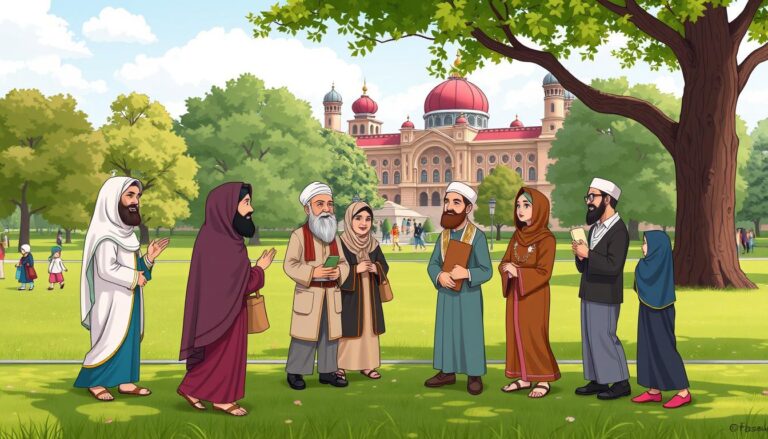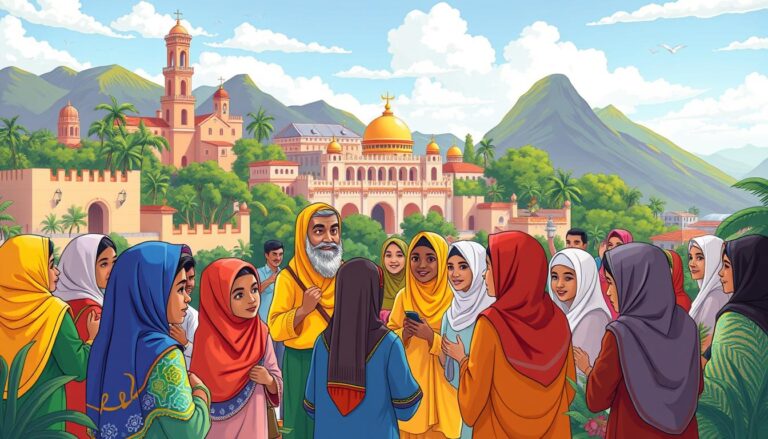Islam in Canada
Islam is the second-largest religion in Canada, with the Muslim population making up approximately 4.9% of the country’s total population, according to the 2021 census. This diverse community of over 1.7 million individuals has deep roots in Canada, tracing its history back to the 1800s and the establishment of the first mosque in 1938 in Edmonton.
The Muslim community in Canada is remarkably diverse, with adherents hailing from a wide range of ethnic and national backgrounds, including Pakistan, Bangladesh, India, Iran, Africa, the Arab world, Turkey, the Balkans, the Caucasus, Southeast Asia, and Latin America. This rich tapestry of cultures and traditions has contributed to the vibrant and dynamic nature of Islam in Canada.
Key Takeaways
- Islam is the second-largest religion in Canada, with a rapidly growing population that now makes up nearly 5% of the total population.
- The Muslim community in Canada is highly diverse, with adherents from various ethnic and national backgrounds, including Pakistani, Bangladeshi, Indian, Iranian, African, Arab, Turkish, Bosniak, Albanian, Caucasian, Southeast Asian, and Latin origins.
- Islam has been present in Canada since the 1800s, with the first mosque established in 1938 in Edmonton.
- The Greater Toronto Area and Greater Montreal have significant Muslim populations, accounting for 10% and 8.7% of their respective metropolitan areas.
- The Muslim population in Canada has seen a remarkable growth, increasing from just 13 individuals in 1871 to over 1.7 million in 2021, a 68.5% increase.
Introduction to Islam in Canada
Historical Background and Demographics
The presence of Islam in Canada dates back to the mid-19th century, with the arrival of the first recorded Muslim family from Scotland in the early 1850s. Over the past two decades, the Muslim population has experienced a remarkable growth, surpassing the one million mark by 2011. Today, Muslims make up over 3% of Canada’s population, representing one of the fastest-growing religious groups in the country.
The historical roots of Islam in Canada can be traced to the migration of Muslim laborers from various regions, including Syria, Lebanon, Albania, Yugoslavia, and Mongolia, who came to work on the Canada Pacific Railway around 1880. The construction of Canada’s first mosque, the Al-Rashid Mosque in Edmonton, coincided with reports of around 700 Muslims in the country in 1938.
Significant events in the growth of the Muslim community in Canada include the establishment of the Islamic Studies program at McGill University in 1952, the opening of the London Muslim Mosque in Ontario in 1955, and the founding of the Islamic Foundation of Toronto in 1969. The removal of European Immigration Preferences in the 1960s also contributed to an increase in Muslim arrivals in Canada.
The Muslim population in Canada has continued to grow, with significant influxes from regions like Lebanon, Somalia, and Bosnia in the 1980s and 1990s. Today, the largest Muslim communities are found in the suburbs of Toronto, such as Brampton, Scarborough, and Mississauga.
“The first recorded Muslims in Canada were James and Agnes Love in 1854.”
The demographics of the Muslim Canadian community are diverse, with Sunnis accounting for the majority, while Shi’as and Ahmadiyyas make up smaller but significant segments. The Ismai’ilis in Canada are known for their social activism and involvement in politics.
The growth of the Muslim population in Canada has been a significant trend, reflecting the country’s increasing religious and cultural diversity. As the community continues to thrive, understanding its historical background and demographics provides valuable insights into the evolving landscape of Islam in Canada.
Diversity Within the Muslim Canadian Community
The Muslim Canadian community is a vibrant and diverse tapestry, representing individuals from a wide range of ethnic and cultural backgrounds. According to the 2011 National Household Survey, the Greater Toronto Area alone was home to 424,925 Muslims, comprising 7.7% of the total metropolitan population. This community encompasses people of Pakistani, Bangladeshi, Indian, Iranian, African, Arab, Turkish, Bosniak, Albanian, Caucasian, Southeast Asian, and Latin descent.
Similarly, the Greater Montreal area had a Muslim population of 221,040, or nearly 6% of the total metropolitan population, reflecting the same level of diversity. This community includes individuals from Western/Southern Europe, the Caribbean, North Africa, the Middle East, and the Indian subcontinent.
The diversity of the Muslim Canadian community is a testament to the country’s rich cultural tapestry. As the proportion of Canada’s population who identify as Muslim, Hindu, or Sikh has more than doubled in the past 20 years, the nation’s religious landscape continues to evolve and flourish. This diversity is further highlighted by the growth of other racialized groups, such as South Asian, Chinese, and Black Canadians, who together represent 16.1% of the total population in 2021.
“The Muslim Canadian community is a vibrant and diverse tapestry, representing individuals from a wide range of ethnic and cultural backgrounds.”
The rich diversity within the Muslim Canadian community is a testament to the country’s commitment to multiculturalism and inclusion, as people from various ethnic backgrounds and cultural backgrounds find a welcoming home in Canada. This diversity not only strengthens the community but also contributes to the diversity of Canada as a whole.
Establishment of Islamic Institutions
The development of Islamic infrastructure in Canada can be traced back to the early 20th century. The first Canadian mosque, the al-Rashid Mosque, was constructed in 1938 in Edmonton, Alberta, catering to a small Muslim population of around 700 European immigrants at the time. This historic mosque is now part of the museum at Fort Edmonton Park, preserving the legacy of Canada’s earliest Islamic institutions.
As the Muslim community in Canada continued to grow, new mosques and Islamic centers were established across the country. In 1968, the Jami Mosque, the first mosque in Toronto, was founded by Bosniaks and Albanian Muslims, who repurposed an old Catholic school building into a masjid. Over the decades, a network of mosques and Islamic centers has evolved, providing spaces for religious observance, community gatherings, and educational programs for the expanding Muslim population.
Mosques and Islamic Centers
Some of the notable Islamic institutions in Canada include:
- The Islamic Association of Nova Scotia (IANS), founded in 1966, is one of the country’s oldest Muslim organizations and operates the Dartmouth IANS Mosque, built in 1971, which is claimed to be one of the first purpose-built mosques in Canada.
- The Muslim Association of New Brunswick, headquartered in Saint John, has been instrumental in establishing prayer services and organizing mosques in the province, with the involvement of community leaders like Abid Syed Sheikh.
- The Islamic Cultural Centre of Quebec City, founded in 1985 at Université Laval, serves the Muslim community in the province.
- The British Columbia Muslim Association (BCMA) represents nearly 60,000 Muslims in the province and oversees the operations of eight mosques and two Islamic schools.
The development of Islamic infrastructure in Canada has been a gradual process, reflecting the growth and diversification of the Muslim community across the country. These mosques and Islamic centers serve as hubs for religious, educational, and social activities, contributing to the integration and belonging of Muslims in Canadian society.
Islam in Canada
Islam has become an integral part of the Canadian social fabric, with Muslims contributing to various aspects of Canadian society. The role of Islam in Canadian society is significant, with the Muslim community playing an active role in political, economic, and social spheres. The impact of Islam on Canadian culture is evident in the diversity and vibrancy it brings to the country.
The Muslim population in Canada has grown steadily over the years, from just 98,160 in 1981 to over 1.7 million in 2021, representing around 4.9% of the total population. This growth can be attributed to increased immigration, particularly after the late 1960s when European immigration preferences were removed. The Muslim community in Canada is diverse, consisting of over 60 ethno-cultural groups with various organizations advocating for their rights and needs.
The contribution of Muslims to Canada is significant, with the establishment of numerous mosques, Islamic centers, and other institutions across the country. These institutions cater to the religious and cultural needs of the Muslim community, helping to increase the visibility and recognition of Islam within Canadian society. Muslims in Canada are also actively involved in various sectors, including politics, business, and academia, enriching the country’s cultural diversity.
Despite facing some challenges, such as integrating Islamic practices into daily life and navigating differences in gender roles and dietary restrictions, the Muslim community in Canada has shown resilience and a strong sense of belonging. The future prospects for the role of Islam in Canadian society are promising, as the Muslim population continues to grow and contribute to the country’s social, economic, and cultural fabric.
“The Muslim community in Canada is a vibrant and integral part of our society, contributing to the diversity and richness of our nation.”
Integration and Belonging
Despite facing challenges such as discrimination and stereotyping, the majority of Muslim Canadians feel a strong sense of attachment to Canada and a desire to integrate into the broader society. Surveys have shown that over 80% of Muslim Canadians are proud to be Canadian, a sentiment that has strengthened over the past decade, especially in Quebec.
Sense of Identity and Attachment to Canada
Muslim Canadians are just as likely as non-Muslims to express the view that their Canadian identity is very important. They also agree with other Canadians on the values that immigrants should adopt, such as language fluency, tolerance, respect for others, and appreciation of Canadian history and the rule of law.
“The study concludes that Canadian Muslims are well integrated socially, despite community concerns about discrimination and divisive public policy areas.”
The integration of Muslims in Canada has led to a decrease in social exclusion and religious resentment. Perceived assimilation of Muslims in Canadian society has also positively influenced the attitudes of non-Muslim Canadians towards Muslims.
- Immigrants make up 20 percent of the Canadian population.
- The study utilized the Ethnic Diversity Study (EDS) and Environics’ Survey of Muslims in Canada to examine social integration among the diverse Muslim communities in Canada.
- The study assessed the sense of belonging among Muslim Canadians to understand their experiences and sentiments related to belonging.
While there have been specific incidents of debate and anxieties, such as the proposal to use religious law in family-based disputes and concerns over homegrown violent extremism, the overall picture suggests that Muslim Canadians have a strong Canadian identity and a sense of belonging to the country.
Religious Observance and Cultural Practices
Muslim Canadians are among the country’s most religiously observant groups, with their religious identity and practices strengthening as their lives evolve in the Canadian context. An increasing number of Muslims are attending mosques for prayers on a regular basis, and more Muslim women are wearing the hijab, particularly among those aged 18 to 34.
This trend contrasts with the broader Canadian society, where younger generations are turning away from organized religion. Muslim Canadians also maintain a strong emphasis on family and traditional cultural practices, though there is some evidence that these values may align more closely with the broader Canadian perspective over time.
The role of religion in the lives of Muslim Canadians is significant, as they strive to balance their religious observance with their cultural practices and the realities of living in a diverse, multicultural society. From regular mosque attendance to the wearing of the hijab, the religious practices of Muslim Canadians are an integral part of their daily lives and identity.
“Islam is not just a religion for us, it’s a way of life. Our religious practices and cultural traditions are deeply intertwined and play a vital role in shaping our identity as Canadian Muslims.”
The cultural practices of Muslim Canadians also reflect their diverse backgrounds and heritage. Celebrations like Eid al-Fitr and Eid al-Adha are observed with great fervor, and traditional cuisine, music, and art remain an essential part of their cultural expression.
- Attending mosques for regular prayers
- Wearing the hijab, particularly among younger Muslim women
- Observing religious festivals like Eid al-Fitr and Eid al-Adha
- Maintaining traditional cultural practices and heritage
- Balancing religious observance with life in a diverse, multicultural society
Challenges and Misconceptions
Muslim Canadians, like other minority groups, continue to face significant challenges related to discrimination and stereotyping. According to recent data, one-third of Muslim Canadians have experienced discrimination in the past five years, primarily due to their religion or ethnicity. These negative experiences occur in various settings, including the workplace, public spaces, retail establishments, and educational institutions.
Misconceptions about Muslim Canadians are also prevalent, with nearly half of Canadians (46%) holding an unfavorable view of Islam – more than for any other religious tradition. Fewer than half of Canadians would find it “acceptable” for one of their children to marry a Muslim, and over half (56%) believe that Islam suppresses women’s rights. Additionally, 52% of Canadians feel that Muslims can only be trusted “a little” or “not at all,” and 42% think discrimination against Muslims is “mainly their fault.”
Combating Stereotypes and Discrimination
To combat these challenges, Muslim Canadians and their allies have been working tirelessly to educate the broader public, promote interfaith dialogue, and advocate for policies that protect religious freedoms and combat discrimination. The federal government has also taken steps to address systemic racism and religious discrimination, including Islamophobia, by submitting 30 recommendations to the Standing Committee on Canadian Heritage.
Despite the ongoing efforts, hate-motivated incidents targeting religious, racial, and ethnic minorities have shown a disturbing increase in recent years. The National Council of Canadian Muslims reported a surge in Islamophobic incidents since October 2023, due to the escalating violence in Palestine and Israel. This highlights the need for continued vigilance and a collective commitment to combat stereotypes and discrimination against Muslim Canadians.
“The report ‘Islamophobia at Work: Challenges and Opportunities’ provides recommendations for employers, unions, and government on addressing Islamophobia.”
By addressing the challenges faced by Muslim Canadians and combating the misconceptions that perpetuate discrimination, we can foster a more inclusive and understanding society that celebrates the diversity and contributions of all its members.
Future Prospects and Contributions
As the future of Islam in Canada continues to unfold, the contributions of Muslim Canadians to Canadian society are expected to be significant. Muslim Canadians are actively engaged in various sectors, including politics, business, academia, and the arts, helping to shape the country’s cultural, social, and economic landscape.
The community’s strong sense of identity and attachment to Canada, combined with its diversity and willingness to integrate, suggest that Muslim Canadians will continue to play a vital role in shaping Canada’s future. As the Muslim population in Canada continues to grow, their participation in shaping the country’s future development and prosperity is anticipated to be pivotal.
Recent statistics highlight the increasing religious diversity in Canada. In 2021, Muslims made up 4.9% of the population, up from 2% in 2001. Similarly, the share of Hindus and Sikhs has also grown, reflecting the evolving religious landscape of the country. This diversity is a testament to Canada’s commitment to multiculturalism and the ongoing integration of various communities into the national fabric.
However, the journey has not been without its challenges. Instances of Islamophobia and discrimination continue to persist, as evidenced by the rise in hate crimes against Muslims and the implementation of policies like Quebec’s Bill 21, which have drawn criticism from the Muslim community. Addressing these challenges and fostering greater understanding and inclusivity will be crucial for the future of Islam in Canada.
Positively, the establishment of the Office of the Special Representative on Combatting Islamophobia in 2023 represents a significant step in the right direction. This office aims to provide guidance, advance public education, and engage with stakeholders to combat stereotypes and promote the diversity of Muslim communities in Canada.
As the future of Islam in Canada unfolds, the contributions of Muslim Canadians and their role in shaping Canada’s future will undoubtedly continue to be significant. The community’s resilience, integration, and active participation in various sectors will undoubtedly leave a lasting impact on the country’s social, cultural, and economic fabric.
“The future of Islam in Canada is bright, as the contributions of Muslim Canadians continue to shape the country’s diverse and inclusive landscape.”
Conclusion
The story of Islam in Canada is one of growth, diversity, and integration. With the Muslim community representing one of the country’s fastest-growing religious groups, the presence of Islam has become an integral part of the Canadian social fabric. Canadian Muslims come from a wide range of ethnic and national backgrounds, and they have established a robust network of Islamic institutions, including mosques and Islamic centers, across the nation.
Despite facing challenges related to discrimination and misconceptions, the majority of Muslim Canadians feel a strong sense of attachment to the country and a desire to integrate into broader society. As the Muslim population continues to expand and contribute to various aspects of Canadian life, the future prospects for Islam in Canada remain promising. The community is poised to play an increasingly influential role in shaping the country’s cultural, social, and economic landscape, further enriching the tapestry of Canada’s multicultural identity.
In summary, the story of Islam in Canada is one of resilience, adaptation, and an unwavering commitment to being an integral part of the nation’s diverse fabric. As the Muslim community continues to grow and thrive, the future outlook for Islam in Canada remains optimistic, with the potential to significantly impact the country’s social, cultural, and economic trajectories.
Source Links
- Islam in Canada
- ‘No empty words’: Muslim Canadians use Ramadan to urge Gaza action
- Canada is Experiencing a Rise in Anti-Muslim Attacks – Bridge Initiative
- About 4 — Islamic History Month Canada
- No title found
- Muslim Pioneers* in Canada’s North
- Ethnocultural and religious diversity – 2021 Census promotional material
- The Muslim Experience in Canada – Issuu
- fc64-intro-fed.indd
- Islam in Canada
- The Muslim Communities of Canada – Issuu
- History
- Muslims in Canada
- Islam now second most popular religion in Canada
- Project MUSE – Gauging Social Integration among Canadian Muslims: A Sense of Belonging in an Age of Anxiety
- Cultural similarity predicts social inclusion of Muslims in Canada: A vignette-based experimental survey
- Canadian – Religion
- 5 facts about religion in Canada
- Religion in Canada
- Canada’s unions mark January 29 with a call to action | Canadian Labour Congress
- 50 years of multiculturalism: Being Muslim in Canada
- Religions on the rise: Islam, Hinduism and Sikhism are thriving in Canada | Broadview Magazine
- 2023-2024 Annual Report – Canada.ca
- Discrimination experienced by Muslims in Ontario







